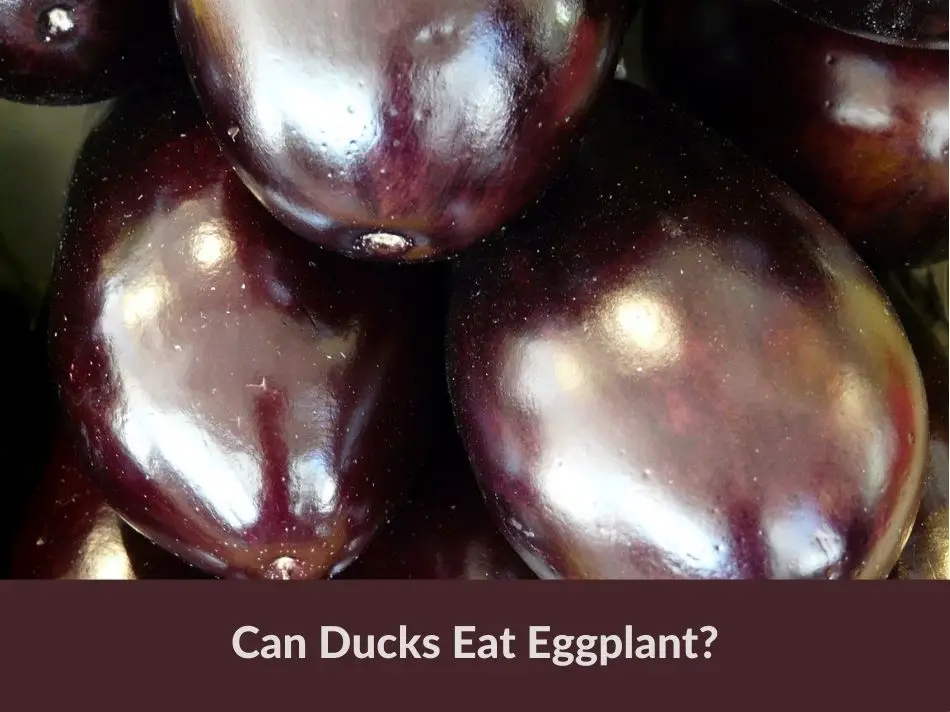Ducks, like many animals, have specific dietary needs and sensitivities. Ducks are omnivorous and can consume a wide variety of foods. But, can ducks eat eggplant?
No, ducks should not eat eggplant. Eggplant belongs to the nightshade family, which are known to contain alkaloids. One specifically is toxic to ducks, called solanine and this can cause difficulty breathing and paralysis.
In this article, we delve into the reasons why ducks shouldn’t consume eggplant, a member of the nightshade family. Highlighting the presence of potentially harmful alkaloids, particularly solanine, we discuss the risks these compounds pose to a duck’s digestive system and overall health.
What are Nightshades?
Nightshades are a family of plants known scientifically as Solanaceae. This family includes many vegetables that are common in our diets, such as tomatoes, potatoes, bell peppers, and, of course, eggplants (also known as aubergines). These plants contain a group of naturally occurring chemical compounds called alkaloids.
Alkaloids and Their Effects
Alkaloids, while beneficial to the plants as a defense mechanism against pests, can be toxic in high amounts to animals and humans. The specific alkaloids found in nightshades include solanine, capsaicin, and nicotine, among others. In eggplants, the primary concern is solanine.
Solanine is most concentrated in the green parts of the eggplant, especially the leaves and stems, but it’s also present in the fruit itself. While humans can tolerate and metabolize small amounts of solanine, ducks and other animals might not be so fortunate.
Why Ducks Should Avoid Eggplants
- Digestive System Sensitivity: Ducks have a different digestive system than humans. What might be harmless or even beneficial for us can be harmful to them. The solanine in eggplants can irritate a duck’s digestive tract, leading to discomfort or more severe health issues.
- Toxicity: In larger quantities, solanine can be toxic. Symptoms of solanine poisoning in birds can include lethargy, difficulty breathing, and even paralysis. While a duck would need to consume a significant amount of eggplant to reach toxic levels, it’s better to be safe than sorry.
- Nutritional Imbalance: Feeding ducks foods that aren’t part of their natural diet can lead to nutritional imbalances. While an occasional treat might not be harmful, consistently feeding them foods like eggplant can deprive them of the essential nutrients they need.
Eggplant Nutritional Value
Below is the nutritional value of 100 grams of eggplant.
- Calories: 25
- Protein: 1 g
- Total Fat: 0.2 g
- Carbohydrates: 6 g
- Dietary Fiber: 3 g
- Sugars: 3.5 g
- Water: 92 g
It also contains several vitamins and minerals as listed below.
- Manganese
- Folate
- Potassium
- Vitamin K
- Vitamin C
- Niacin
- Magnesium
- Copper
Other Vegetables Ducks Can Safely Eat
Ducks have a versatile diet that can include a variety of vegetables. Below are some safe and nutritious vegetables ducks can eat.
Conclusion
While the occasional small piece of eggplant might not immediately harm a duck, it’s best to avoid feeding them this vegetable altogether. The potential risks associated with the solanine content and the digestive differences between ducks and humans make it a less-than-ideal food choice.
Instead, stick to grains, vegetables, and other foods that are known to be safe and nutritious for ducks.
Disclaimer: The information in this article is for informational purposes only. I'm not an expert or a veterinarian.


